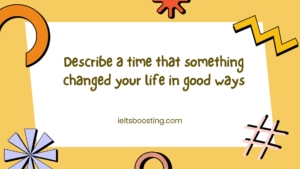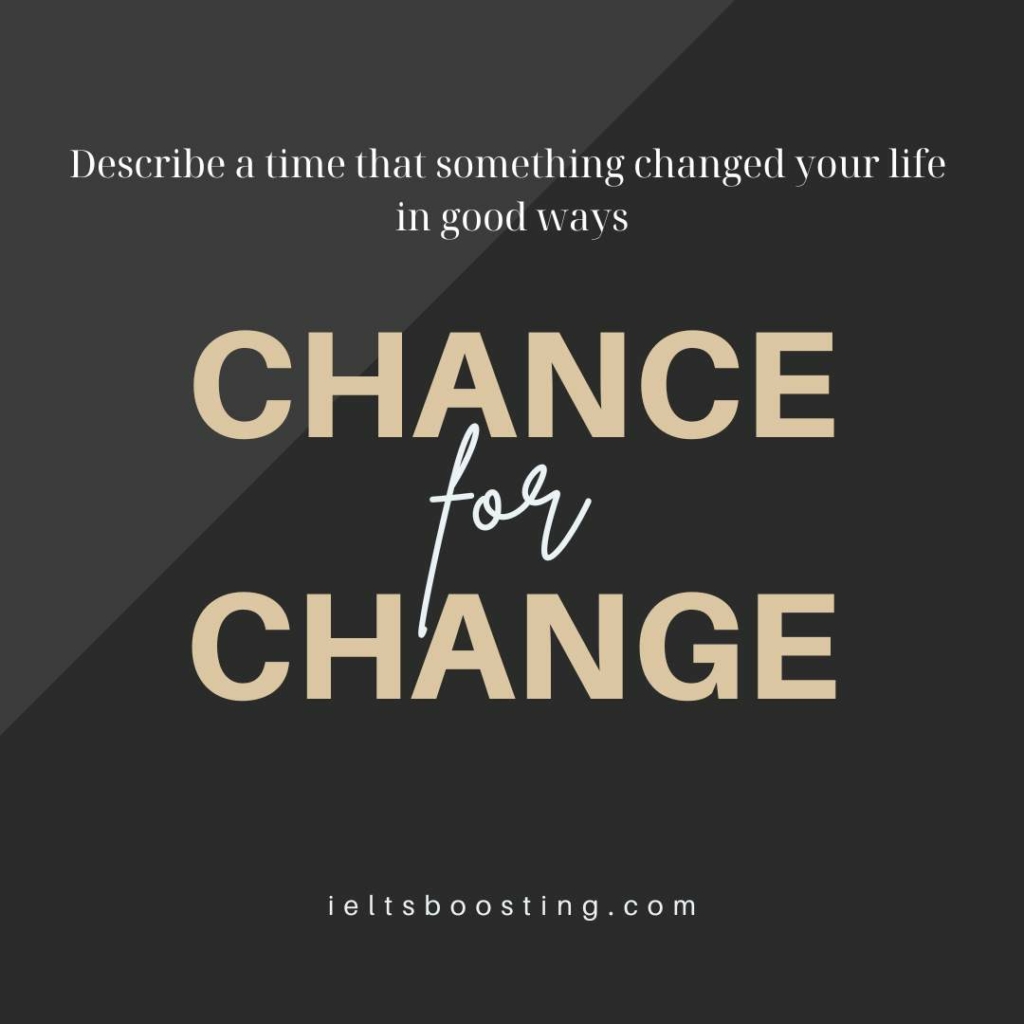Describe a time that something changed your life in good ways
You should say:
When and where it happened
What happened
How you felt about it
And explain how it changed your life in good ways

Describe a time that something changed your life in good ways
Sample answer to Describe a time that something changed your life in good ways
So, there was this one time that really changed my life for the better. It happened a few years ago when I stumbled upon this old book store in my city. I found a book called “How to Win Friends and Influence People” by Dale Carnegie. It’s pretty famous, but I’d never read it before. I remember feeling intrigued and a bit skeptical, but I decided to give it a shot.
Reading that book was like a lightbulb moment for me. It’s filled with practical advice on how to communicate better, understand people, and build relationships. The part about active listening and showing genuine interest in others really hit home. It made me reevaluate how I interacted with people.
The impact this book had on my life was huge. I started applying the principles in my daily interactions, and I noticed a significant improvement in my personal and professional relationships. I became more confident in social situations, and I felt like I was really connecting with people on a deeper level. That book didn’t just teach me skills; it changed my perspective on how to relate to others, and that’s been invaluable.
Useful Vocabulary:
- Stumbled upon: Found or discovered something by chance.
- Intrigued: Aroused the curiosity or interest of; fascinated.
- Skeptical: Not easily convinced; having doubts or reservations.
- Lightbulb moment: A moment of sudden realization, enlightenment, or inspiration.
- Active listening: Fully concentrating, understanding, responding, and remembering what is being said.
- Reevaluate: Review or assess something again or in a different way.
- Principles: Fundamental truths or propositions that serve as the foundation for a system of belief or behavior.
- Confident: Feeling or showing certainty about something.
- Connecting with people: Forming a relationship or feeling of closeness with others.
- Perspective: A particular attitude towards or way of regarding something; a point of view.
Explore more: ielts speaking part 2

Describe a time that something changed your life in good ways
Part 3- Describe a time that something changed your life in good ways
Do you like new things or changes in life?
Yeah, I’m definitely someone who embraces new things and changes in life. I think they keep things exciting and fresh. It’s like, when you try something new or change up your routine, it can really breathe new life into your day-to-day. Sure, it can be a bit daunting at times, and there’s always a bit of uncertainty, but that’s part of the fun. It pushes you out of your comfort zone, and I’ve found that’s often where the best growth happens. Plus, adapting to change has helped me become more resilient and open-minded.
Useful Vocabulary:
- Embraces: Accepts or supports willingly and enthusiastically.
- Routine: A sequence of actions regularly followed.
- Daunting: Seeming difficult to deal with; intimidating.
- Uncertainty: The state of being unsure or not able to be predicted.
- Comfort zone: A place or situation where one feels safe or at ease.
- Growth: The process of developing or maturing physically, mentally, or spiritually.
- Resilient: Able to withstand or recover quickly from difficult conditions.
- Open-minded: Willing to consider new ideas; unprejudiced.
Why do some people quit and change jobs?
People quit and change jobs for a bunch of reasons. One big one is seeking better opportunities or career growth. Like, if someone feels they’re stuck in a dead-end job, they might look for something that offers more advancement or learning opportunities. Another reason could be the work environment – maybe it’s just not a good fit, or there’s too much stress. And let’s not forget about work-life balance. Nowadays, a lot of folks prioritize having time for family or hobbies, so if a job’s too demanding, they might switch to something more flexible. Plus, some people just crave new challenges and experiences to keep things interesting.
Useful Vocabulary:
- Career growth: Advancement in one’s job or professional life.
- Dead-end job: A job with little or no possibility of advancement.
- Advancement: Progress in a career or occupation.
- Work environment: The setting or conditions in which one works.
- Work-life balance: The balance that an individual needs between time allocated for work and other aspects of life.
- Demanding: Requiring much time, effort, or attention.
- Flexible: Able to be easily modified to respond to altered circumstances.
- Crave: Feel a powerful desire for something.
- Challenges: Difficult tasks or problems that test someone’s ability or determination.
How do you adapt to changes in life?
Who can adapt better to changes, children or adults?
It’s kind of interesting when you think about it. In many ways, children can adapt to changes better than adults. They’re like sponges, soaking up new information and experiences without many preconceived notions. They tend to be more flexible and less set in their ways compared to adults. But on the flip side, adults have more life experience and skills to navigate through change, especially the tough stuff. They can draw on past experiences and use their problem-solving skills. So, I guess it depends on the type of change we’re talking about. Kids might be better at adapting to new environments or learning new technologies, while adults might handle changes in life circumstances or complex emotional changes more effectively.
Useful Vocabulary:
- Preconceived notions: Ideas or opinions formed before having the evidence for their truth or usefulness.
- Flexible: Capable of bending easily without breaking.
- Navigate through change: To manage or deal with a change or transition.
- Problem-solving skills: The ability to find solutions to difficult or complex issues.
- Life circumstances: The conditions or situations of a person’s life.
- Complex emotional changes: Deep and complicated alterations in feelings or emotions.
When things like getting married or moving home happen, what kinds of things would you consider?
When it comes to big life changes like getting married or moving home, there’s a lot to consider. With marriage, it’s not just about the love you have for your partner; it’s also thinking about compatibility, shared values, and life goals. You know, it’s important to be on the same page about big things like finances, family planning, and how you handle conflicts. As for moving home, the considerations are a bit different. You’d think about the location, like is it close to work or family? What’s the community like? And of course, the practical stuff like the cost of living in the new area, the size of the new place, and whether it suits your lifestyle. These decisions are huge because they shape your life and future.
Useful Vocabulary:
- Compatibility: The ability to live or work together in harmony.
- Shared values: Beliefs or standards that multiple people hold in common.
- Life goals: Long-term aims or desired results in life.
- Finances: Monetary resources and how they are managed.
- Family planning: The practice of controlling the number of children in a family and the intervals between their births.
- Conflict resolution: The process of resolving a dispute or a conflict.
- Cost of living: The level of prices relating to a range of everyday items.
- Lifestyle: The way in which a person or group lives.
What are the disadvantages when people keep making changes?
When people keep making changes, there can definitely be some downsides. For starters, it can lead to a lack of stability and security. You know, constantly shifting gears means you’re always in a state of adjustment and never really settled. This can be especially tough if you’re talking about big life changes like jobs or moving homes. Also, too much change can lead to decision fatigue – where you just get worn out from making so many choices. And let’s not forget about the impact on relationships. Constant change can strain friendships and family ties, as people may find it hard to keep up with your ever-changing life.
Useful Vocabulary:
- Lack of stability: The absence of steadiness and constancy in life.
- Security: The state of being free from danger or threat.
- Adjustment: The process of adapting or becoming used to a new situation.
- Decision fatigue: Deterioration in the quality of decisions made by an individual after a long session of decision making.
- Strain: To put pressure on something or someone.
- Friendships and family ties: Relationships with friends and family members.
- Keep up with: To stay at the same rate or level as someone or something.



